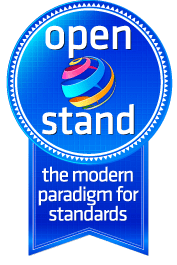Karen McCabe, Senior Director, Technology Policy and International Affairs, IEEE Standards Association
OpenStand—encapsulating a time-tested and common set of values that have been successfully utilized in global, open standards development for decades—celebrated its two-year anniversary in August 2014. The global, open development community was surveyed on open-stand.org how open standards have changed the world over the last 25 years. Among the responses:
“In technology development, open standards are the fundamental pillars for the worldwide economic growth and progression in all sectors of the economy.”
“Well, *without* open standards, the Internet as a whole would definitely have collapsed under the tremendous entropy created by the expansion of applications, network device roles, and different implementations. It is just amazing, given the end-to-end complexity, that it works so well, and that is due largely to the open standards. The whole process of developing and maintaining open standards has also helped to maintain the infrastructure and atmosphere for continued collaboration and cooperation between major technology and infrastructure providers over the years, as the Internet itself has increasingly become a venue for intense commercial competition.”
 The globally open standards approach that the OpenStand principles document has demonstrated agility, as witnessed in the development and deployment of Internet standards such as those developed by W3C, IETF and IEEE. The approach is driven by technical merit and harnesses global creativity and expertise through bottom-up collaboration, and it has a proven history of fueling the advancement of cutting-edge technology and empowering the rapid economic implementation of high-value, high-demand products and services with societal benefits. It drives technical innovation via processes that ensure direct, open participation—processes that are constructed to embrace different perspectives and interests in pursuing common goals. It produces standards developed without borders to ensure a better future for all.
The globally open standards approach that the OpenStand principles document has demonstrated agility, as witnessed in the development and deployment of Internet standards such as those developed by W3C, IETF and IEEE. The approach is driven by technical merit and harnesses global creativity and expertise through bottom-up collaboration, and it has a proven history of fueling the advancement of cutting-edge technology and empowering the rapid economic implementation of high-value, high-demand products and services with societal benefits. It drives technical innovation via processes that ensure direct, open participation—processes that are constructed to embrace different perspectives and interests in pursuing common goals. It produces standards developed without borders to ensure a better future for all.
Since the launch of the OpenStand movement, the goal has been to mobilize ongoing, global support for the application of open, market-driven principles in technology and standards development. Such principles are of paramount value in the policy discussions on Internet governance practices, and on a broader scale in addressing challenges and opportunities we face today related to rapid technological expansion and growth. Applying these principles will play an essential role in securing the future of open, inclusive, market-driven innovation as the world seeks to solve modern collaboration, standardization, security and privacy challenges in critical infrastructure.
As discussions continue in Internet-governance and at technology and policy intersection points, it is important to reinforce OpenStand precepts which should ground those discussions, including.
Direct participation—There should be no intermediaries between a good idea and the peer group that decides the start of a policy. Everybody, from anywhere, should be able to submit a proposal.
Due process—All participants should be provided a level playing field with equitable rules of engagement and opportunity for participation.
Broad consensus—Decisions should be made by either a majority or supermajority of participants, and no single person or entity should be able to wield undue power in the definition of policy.
Process transparency—Participants must be able to understand the rules of engagement, and appropriate audit trails should be in place.
Universal openness—All potential stakeholders globally should be provided with the opportunity to attend meetings, submit comments and engage in other ways.
The OpenStand principles and its precepts will help secure a future of open, market-driven innovation and unbounded growth around the Internet and beyond for generations to come.
Please visit OpenStand to access resources; videos, Infographics, Whitepapers, and to sign up in show of support for Open Standards. To get involved with developing and maintaining open standards please visit IAB, W3C, IETF, ISOC, and IEEE.

